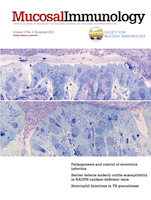
Mucosal Immunology
Scope & Guideline
Championing Excellence in Immunological Research
Introduction
Aims and Scopes
- Mucosal Immune Responses:
The journal investigates how the immune system operates at mucosal surfaces, emphasizing the roles of various immune cells, including T cells, B cells, and innate lymphoid cells, in mediating protective responses against pathogens. - Microbiota and Mucosal Immunity:
Research on the interactions between the microbiota and the immune system is a core focus, exploring how microbial communities influence immune responses and contribute to conditions such as inflammatory bowel disease and allergies. - Pathogenesis of Mucosal Diseases:
The journal covers studies on the mechanisms underlying mucosal diseases, including inflammatory bowel disease, allergies, and infections, providing insights into potential therapeutic approaches. - Innovative Therapeutic Strategies:
Mucosal Immunology also emphasizes the development of novel therapeutic strategies targeting mucosal immunity, including vaccines and immunotherapies aimed at enhancing mucosal responses. - Single-cell and Transcriptomic Analyses:
Utilizing advanced methodologies such as single-cell RNA sequencing and transcriptomic profiling, the journal presents cutting-edge research that uncovers the complexities of immune cell interactions and functions at mucosal sites.
Trending and Emerging
- Impact of SARS-CoV-2 on Mucosal Immunity:
Research examining the effects of SARS-CoV-2 on mucosal immunity has surged, focusing on the interplay between viral infection and mucosal immune responses, as well as implications for vaccination and disease outcomes. - Single-Cell Immunology:
There is a growing trend towards utilizing single-cell technologies to dissect the heterogeneity of immune responses at mucosal surfaces, providing insights into cell-specific functions and interactions. - Metabolic Regulation of Mucosal Immunity:
Emerging studies are highlighting the role of metabolic pathways in regulating mucosal immune responses, suggesting that metabolism plays a critical role in immune cell function and inflammation. - Therapeutics Targeting Gut Microbiota:
Research focusing on microbiota-targeted therapies, including probiotics and dietary interventions, is on the rise as scientists explore their potential to modulate mucosal immunity and treat related diseases. - Regulatory T Cell Dynamics:
The dynamics of regulatory T cells in maintaining mucosal homeostasis and their potential therapeutic applications are increasingly emphasized, reflecting a heightened interest in immune tolerance mechanisms.
Declining or Waning
- Traditional Vaccine Approaches:
Research focusing solely on traditional vaccine approaches for systemic immunity has become less prominent, with a shift towards understanding mucosal vaccination strategies that leverage the unique properties of mucosal immune responses. - Basic Descriptive Studies:
There is a noticeable decline in purely descriptive studies of mucosal immune responses without mechanistic insights. The trend is moving towards studies that integrate functional analyses and therapeutic implications. - Solely Host-Centric Immunology:
Research that focuses solely on host immune responses without considering the role of microbiota and environmental factors is becoming less common, as the interplay between host and microbiome is increasingly recognized as crucial. - Overemphasis on Inflammation:
Studies that primarily emphasize inflammatory processes without exploring regulatory mechanisms or homeostasis in mucosal immunity seem to be declining, as the field shifts towards a more balanced understanding of immune regulation.
Similar Journals
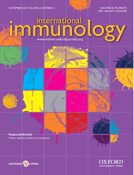
INTERNATIONAL IMMUNOLOGY
Leading the Charge in Immunological Discoveries and Developments.INTERNATIONAL IMMUNOLOGY, published by OXFORD UNIV PRESS, stands out as a premier journal in the field of immunology, providing a vital platform for disseminating groundbreaking research and innovative developments within the discipline. With an impressive Q1 ranking in Immunology and Allergy, as well as in Medicine (miscellaneous), it consistently showcases high-impact studies that contribute to the advancement of immunological knowledge. The journal spans over three decades, from its inception in 1989 to its ongoing contributions as of 2024, thus solidifying its reputation in the scientific community. Researchers, professionals, and students will find valuable articles that delve into the complexities of immune responses, therapeutic interventions, and emerging immunological paradigms, ensuring INTERNATIONAL IMMUNOLOGY remains at the forefront of knowledge in the life sciences.

INFLAMMATION RESEARCH
Advancing knowledge in the realm of inflammation.INFLAMMATION RESEARCH, published by SPRINGER BASEL AG, serves as a pivotal journal in the fields of Immunology and Pharmacology, with notable rankings of Q2 in Immunology and Q1 in Pharmacology as of 2023. With an ISSN of 1023-3830 and an E-ISSN of 1420-908X, this esteemed journal, located in Basel, Switzerland, has been at the forefront of advancing our understanding of inflammatory processes since its inception in 1995. Covering research trends and breakthroughs until 2024, it significantly contributes to both the theoretical frameworks and practical applications within its discipline, boasting a strong Scopus ranking of #40/313 in Pharmacology and #56/236 in Immunology, placing it in the top percentiles for its field. Although it does not offer Open Access options, the journal remains an invaluable resource for researchers, professionals, and students committed to unraveling the complexities of inflammation and its implications in health and disease.

Immunity Inflammation and Disease
Elevating the discourse on therapeutic strategies for inflammatory diseases.Immunity, Inflammation and Disease is a premier open-access journal published by WILEY, dedicated to advancing the field of immunology and allergy. Launched in 2013, this journal has established itself as a significant platform for researchers and professionals to disseminate high-quality research findings and innovative insights that address critical issues in immune responses and inflammatory diseases. With an impact factor that reflects its growing influence and a current ranking in Q3 for Immunology and Q2 for Immunology and Allergy, this journal serves a diverse audience keen on exploring cutting-edge developments. Researchers are encouraged to submit their work to share their findings with a global reach, foster collaboration, and enhance the understanding of immune mechanisms and therapeutic strategies. Accessible since its inception, Immunity, Inflammation and Disease is committed to open science, ensuring that vital research is freely available for the advancement of knowledge within the academic community and beyond.
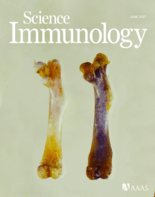
Science Immunology
Unlocking the Secrets of the Immune SystemScience Immunology, published by the American Association for the Advancement of Science, is a leading journal in the field of immunology, recognized for its significant impact and rigor in advancing our understanding of immune responses and complex diseases. With an impressive impact factor that places it in the Q1 category of both immunology and allergy, as well as miscellaneous medicine, this journal is ranked #7 and #8 in their respective Scopus categories, reflecting its high-quality research output. Since its inception in 2016, Science Immunology has been at the forefront of interdisciplinary immunological research, fostering crucial insights that link immunology with pressing health challenges. The journal is committed to providing open access to its content, ensuring that groundbreaking findings are accessible to a global audience of researchers, professionals, and students. Its anthology not only addresses fundamental immunological mechanisms but also enhances the dialogue on translational applications and therapeutic interventions, solidifying its position as an essential resource within the scientific community.

INFECTION AND IMMUNITY
Exploring the Nexus of Infection and Immune ResponsesINFECTION AND IMMUNITY is a distinguished peer-reviewed journal published by the American Society for Microbiology, focusing on groundbreaking research in the fields of infection, immunology, microbiology, and parasitology. Established in 1971, this journal has built a robust legacy, converging years of scientific discovery with a vision towards 2024 and beyond. With an impressive Impact Factor, the journal holds significant rankings in various categories; its Q1 status in both Infectious Diseases and Parasitology underscores its high relevance and quality within the scientific community. Researchers and professionals alike will benefit from its content, as it promotes the latest advances in understanding immune responses and infectious agents, further legitimizing its place among the top quartiles of its respective fields. Access options are provided through traditional subscription models, ensuring a broad charitable dissemination of knowledge. As a pivotal resource for scholars and practitioners alike, INFECTION AND IMMUNITY stands at the forefront of microbiological and immunological research, fostering essential discourse that is crucial for advancing public health and scientific insight.
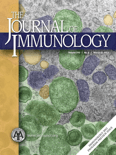
JOURNAL OF IMMUNOLOGY
Exploring Breakthroughs in Immune ScienceWelcome to the JOURNAL OF IMMUNOLOGY, a prestigious publication associated with the American Association of Immunologists and dedicated to advancing the field of immunology. With a rich history dating back to 1945, this journal is renowned for its high-impact research, evident in its notable 2023 Q1 rankings in both Immunology and Allergy, as well as its strong positions in Scopus rankings—Rank #68 in Immunology and Allergy and Rank #79 in Immunology and Microbiology. Although it operates on a subscription basis, its commitment to publishing cutting-edge studies ensures that it remains a vital resource for scientists, healthcare professionals, and students alike. As the journal continues to pave the way for innovative research and breakthroughs in immunological science, it facilitates a platform for dialogue and discovery among researchers and practitioners across the globe.
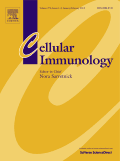
CELLULAR IMMUNOLOGY
Navigating the Landscape of Immunological DiscoveriesCELLULAR IMMUNOLOGY is a prestigious journal published by Academic Press Inc. Elsevier Science, dedicated to advancing the field of immunology. Established in 1970 and converging ongoing research up to 2024, this journal has carved out a significant niche within the academic community, boasting a notable Q2 ranking in the Immunology category and holding a respectable 67th percentile ranking within Scopus for its contributions to the disciplines of Immunology and Microbiology. The journal serves as a vital platform for disseminating high-quality research, reviews, and methodologies that elucidate the intricacies of cellular immune responses, thereby benefiting researchers, professionals, and students alike. Although it does not offer open access, the journal's impact is evidenced by its comprehensive coverage of pioneering studies and ongoing developments in the immunological sciences, positioning it as an essential resource for those seeking to deepen their understanding and engage with the latest findings in cellular immunology.

Innate Immunity
Bridging Fundamental Science with Clinical PracticeInnate Immunity, published by SAGE Publications Ltd, serves as a vital platform for disseminating cutting-edge research in the fields of immunology, microbiology, cell biology, and infectious diseases. With an ISSN of 1753-4259 and an E-ISSN of 1753-4267, this journal has been a prominent contributor to the academic community since its inception in 1996, focusing on the innate immune response and its implications for health and disease. Holding a respectable impact factor and categorized in the Q2 and Q3 quartiles across various relevant domains, Innate Immunity ranks competitively in major databases, including Scopus, where it appears in the top 75th percentile for Infectious Diseases. Researchers and professionals are encouraged to explore its wealth of articles that are pivotal in bridging fundamental immunology with clinical applications, fostering a deeper understanding of immune mechanisms vital for combating human diseases.

Immunological Medicine
Exploring the Frontiers of Immune HealthImmunological Medicine, published by Taylor & Francis Ltd, is an esteemed open-access journal that has made significant strides in the field of immunology since its establishment in 2018. With an E-ISSN of 2578-5826, the journal has quickly gained recognition for its contribution to advancing immunological research, evidenced by its impressive ranking in the Q2 quartile for both immunology and allergy. Positioned in the United Kingdom, it offers a platform for publishing high-quality original research, reviews, and case studies that delve into the complex interactions of the immune system and its implications for human health. The journal serves as a vital resource for researchers, professionals, and students engaged in the burgeoning fields of immunology, providing open access to a wide audience and fostering collaboration and innovation. With a current Scopus ranking of #81 out of 233 in Immunology and Allergy and #97 out of 236 in Immunology and Microbiology, the journal aims to enhance the visibility and impact of cutting-edge research by bridging the gap between academia and clinical practice.

Seminars in Immunopathology
Illuminating the Pathways of Immune ResponsesSeminars in Immunopathology is a premier academic journal published by SPRINGER HEIDELBERG, focusing on the intricate relationships between immune responses and pathologies. With an ISSN of 1863-2297 and an E-ISSN of 1863-2300, this journal delivers cutting-edge research and insights to its readers, contributing significantly to the fields of immunology and allergy, as reflected in its Q1 quartile ranking in both categories for 2023. Positioned in a highly competitive niche, it ranks #18 out of 233 in Immunology and Allergy and #22 out of 236 in Immunology and Microbiology, highlighting its impact within the scientific community. Seminars in Immunopathology publishes comprehensive reviews and research articles, aiming to advance understanding of immune mechanisms in disease and promote interdisciplinary collaboration. Accessible from Germany, this journal is a vital resource for researchers, clinicians, and students seeking to stay at the forefront of immunological advancements and therapeutic innovations.